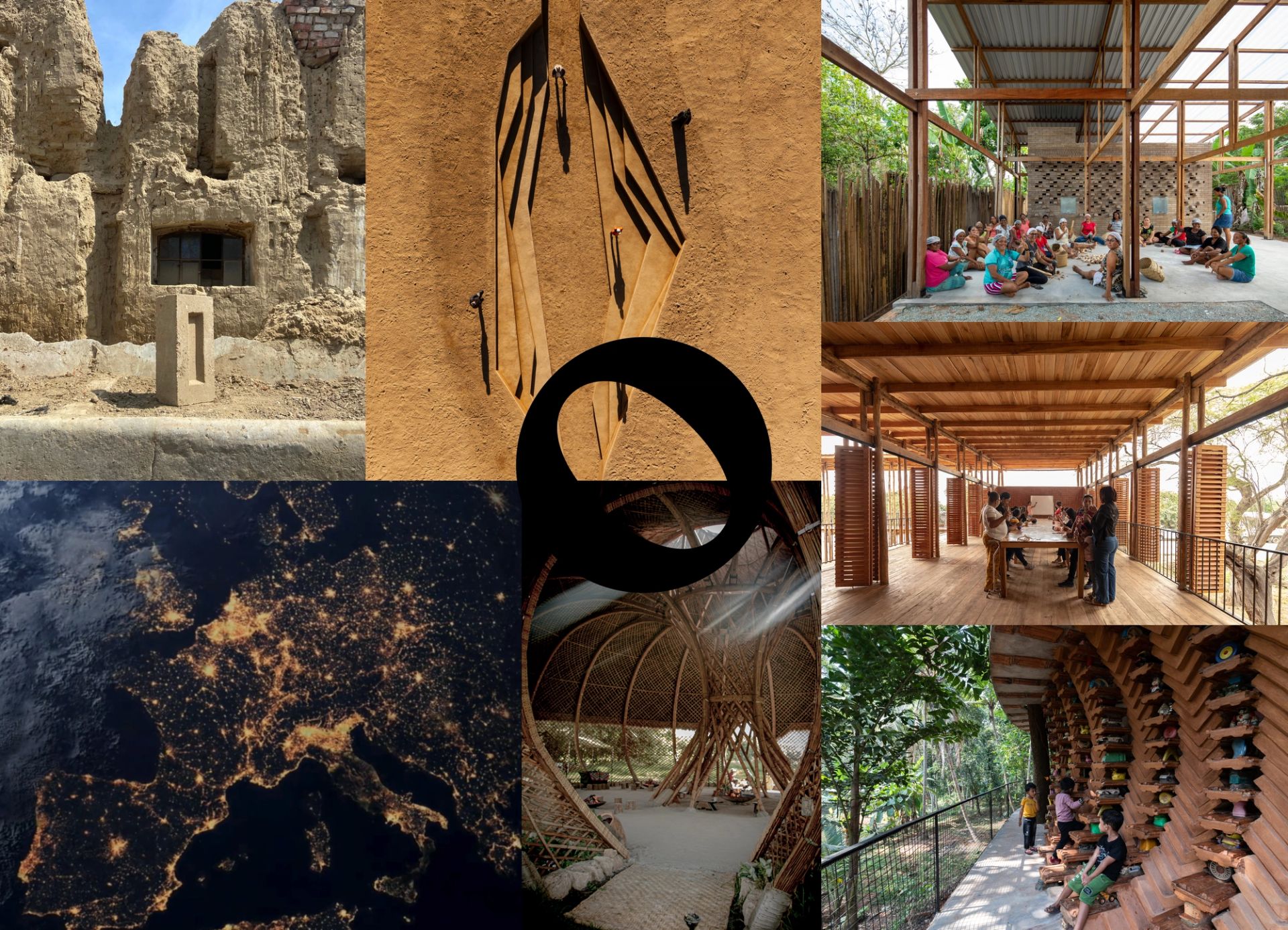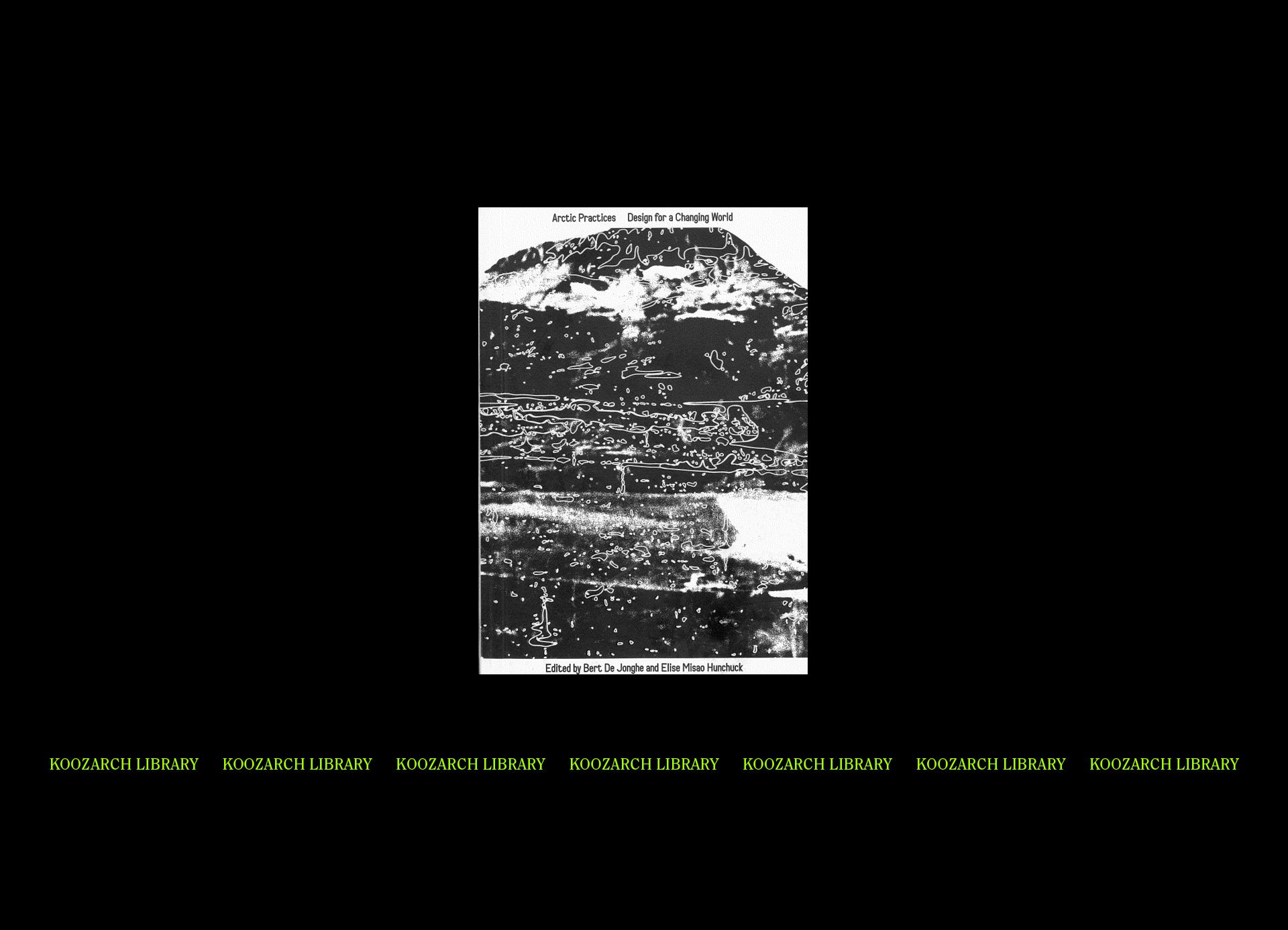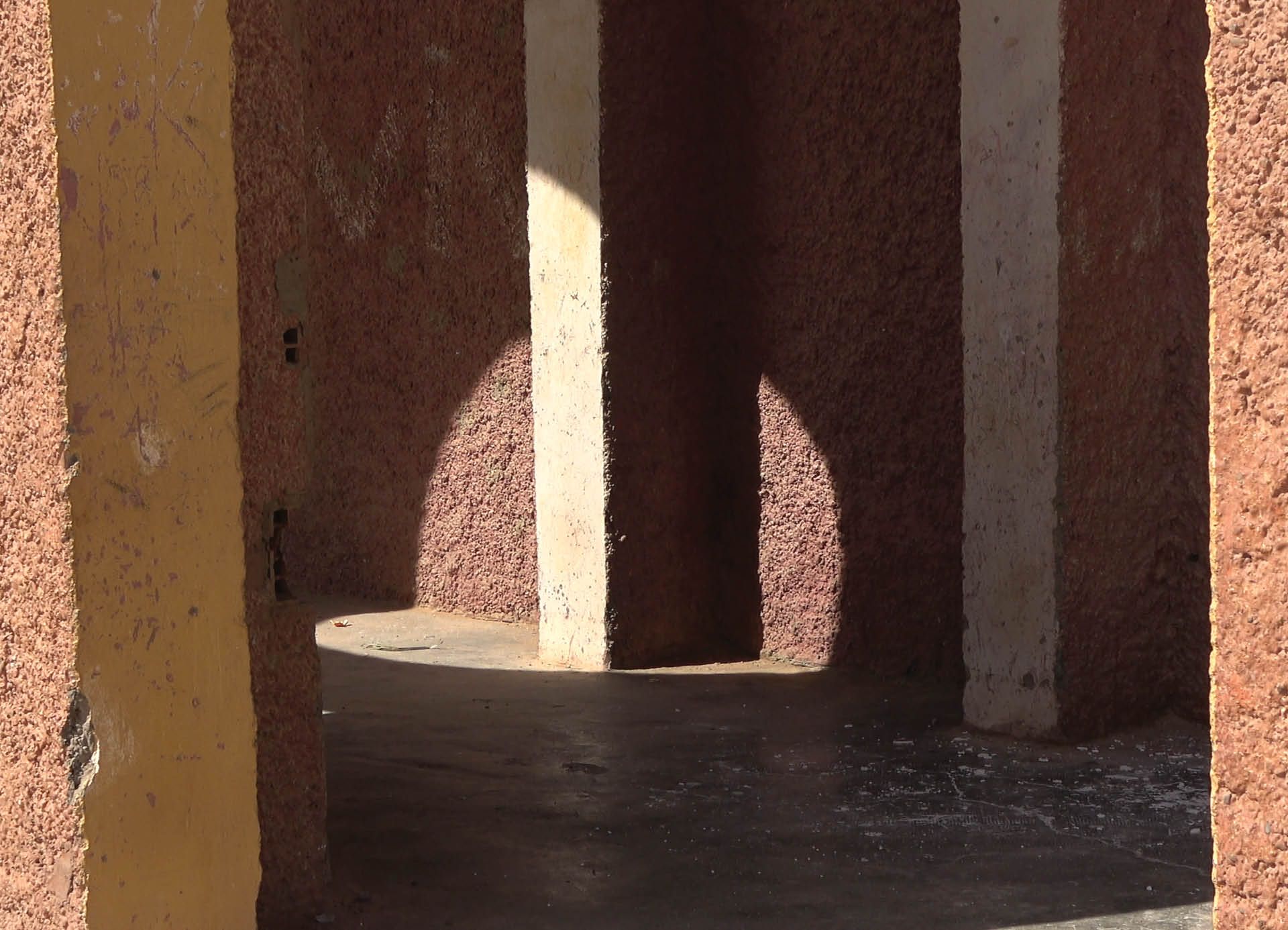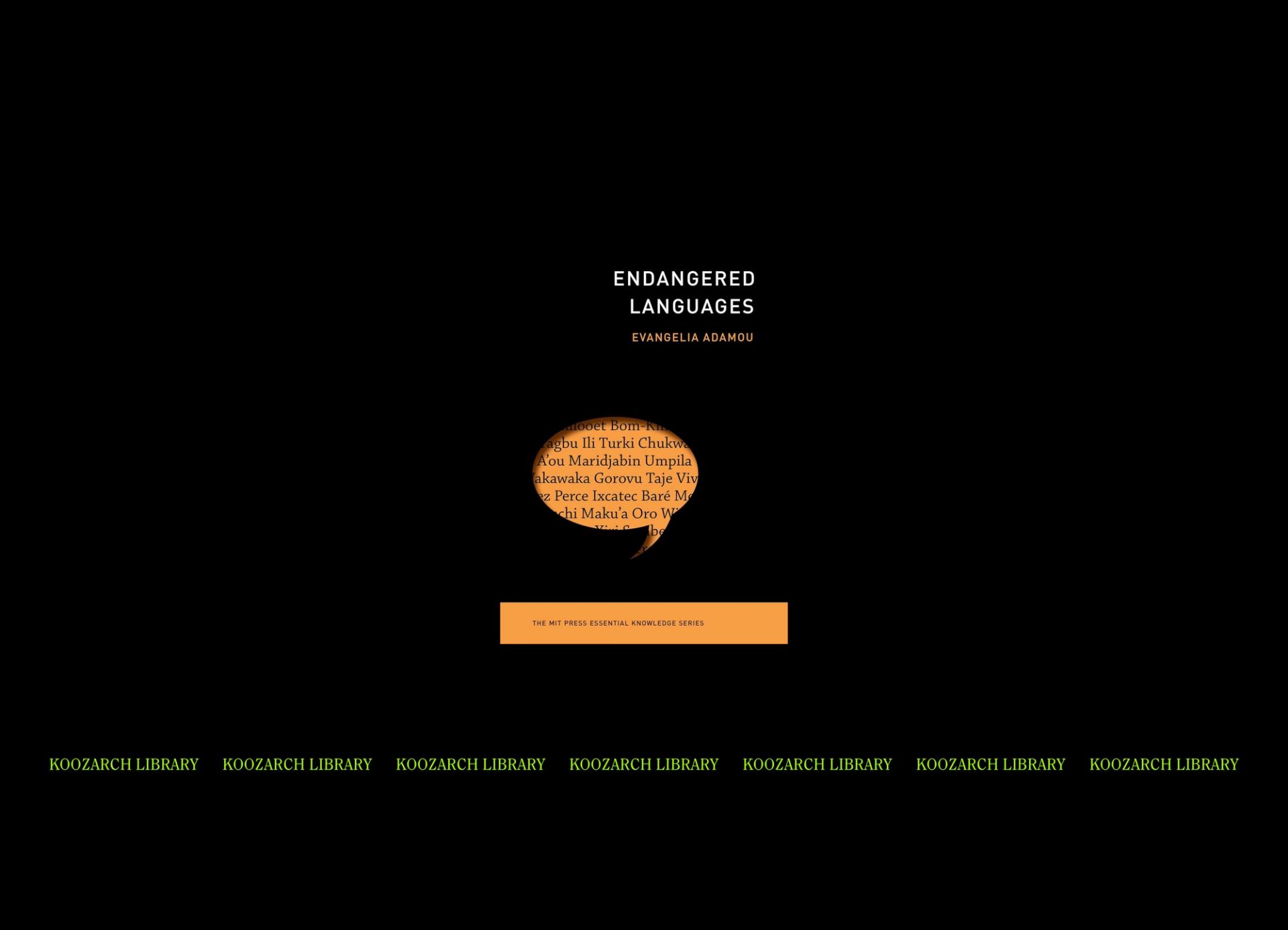A black drape slides open revealing a makeshift stage. On the background an open field of rivers, trees, mountains, and architectural silhouettes reveal the awkward coexistence of ideological and post-ideological icons in a tropical rainforest.
These landscapes appear in the form of Post-Colonial postcards.
Exposition
In the Narrative Architecture studios of Post-Novis (a combination of Post-Colonial and Unovis), worldmakers - as the members of the collective call themselves while they dream of making new worlds possible - rigorously study Diogenesian strategies of subversion to challenge the status quo. In these studios, worldmakers master the skill of operating outside the realm of modern cynicism and its acceptance of ruling ideologies, summoning the ancient Kynical practice of resistance through provocation.
The worldmakers dream about ideal contemporary platforms for inserting diverse voices into a larger discourse, strategizing on ways to use architecture as a framework to address all that has been left out of history.
What was formerly achieved through storyboards of Continuous Monuments (architecture) and No-Stop Cities (urbanism) devoid of people, is now re-imagined through new mediums where this time the settings are reversed, and people take the center stage of the Narratives. The worldmakers dream about ideal contemporary platforms for inserting diverse voices into a larger discourse, strategizing on ways to use architecture as a framework to address all that has been left out of history. Hidden in their laboratories, the worldmakers study media archaeology, the history of presentations and representation, the journey of collections, conservancy, and preservation, the politics of expropriation, the predicaments of redlining, the influence of international banks and monetary funds, the financial jargon of economists and populists, the dangerous menace of GDP and unlimited growth. They scrutinize ways of knowing and ways of making: films and drawings, books and collages, posters, and pamphlets. They devise how to rewrite history by altering into radically bucolic landscapes romantic paintings of expansionist fetishism.
It doesn’t matter how naïve or neutral a project could appear to be, it either responds, consolidates, or maintains the status quo; you are either for or against hegemonic powers.
The members of Post-Novis know about the relationship between ideology, media, and architecture. They know about the architectural embedding of ideological superstructures through books, urban plans, manifestos, and international congresses. They learned that it doesn’t matter how naïve or neutral a project could appear to be, it either responds, consolidates, or maintains the status quo; that either you are for or against hegemonic powers. Aware of the delicate state of the landscapes they now inhabit, the worldmakers planned a different form of Narrative. A play, they thought, provides a powerful space for character development. They imagine the play taking place between the artifacts and worldmaking spaces they have built in the (expropriated) tropical jungle and the (genetically modified) cornfields. The play allows them to focus on the ideological positions and imperatives of each of the different Post-Novis members. It would be a play about diverse voices, a play as a collective manifesto, a play about worldmakers.
The Plot
At first glance, the play recalls the painful memories at the center of two influential educational institutions: the Bauhaus’ miscalculated assumption that only men could think in three dimensions (as opposed to women’s two), and the overlooked and tragic history of Vera Ermolaeva who led the People’s Art School in Vitebsk. But, while it also coincides with the centenary of the Bauhaus and UNOVIS (the collective founded in Vitebsk), the play continues a practice taking place in the US colony of Puerto Rico, where a group of tobacco workers, organized in anarchist syndicates, created a radical alternative practice of education. In its search for alternative forms of diffusion, the play engages with a practice that, a hundred years ago grew international networks like vines over the garden of ideology, extending its subversive fruits over the Americas, from San Juan to New York, from Yvor City to Durham, to La Habana to Santo Domingo, blossoming into what some historians call the most enlightened proletariat force in the continent.
The play continues a practice taking place in the US colony of Puerto Rico, where a group of tobacco workers, organized in anarchist syndicates, created a radical alternative practice of education.
The practice was simple. While tobacco workers engaged in the boring labor of rolling cigars, they would hire one of their own who knew how to read, to read for them during the entire workday. As the practice of loudreading grew, the lectores (loudreaders) will become travelling performers with an international audience, creating new networks of solidarity all around the Caribbean as well as a massive, shared, and open access oral library to workers who were denied any other form of formal education. The books that the lectores read for the workers were mostly books of philosophy or literature that shared an anti-capitalist imagination. The tobacco workers, then, turned the mind-numbing quality of their repetitive, manual, and alienating work of rolling cigars into an advantage, using the same space and tools of their capitalist exploitation to create an anti-capitalist underground culture.
The tobacco workers turned the mind-numbing quality of their alienating work into an advantage, using the same space and tools of their capitalist exploitation to create an anti-capitalist underground culture.
More than just replicating the style and tropes of iconic design schools, the play reconstructs a rebellious ethos of the lectores recognizing the powerful irony in this: exploited workers at the bottom of the capitalist global machine, producing tobacco, a highly addictive substance that generates more demand the more it is consumed, schooling themselves in an anti-capitalist culture of liberation through revolutionary books (anarchists, feminists, communists) read aloud while working for the same machine they are criticizing. From the perspective of the modern cynic, we could imagine the lectores as secretly working for the tobacco corporations serving the purpose of making the workplace more bearable, selling the illusion of an anti-capitalist society to make their capitalist machine more efficient. The lectores, in this cynical depiction, would be selling a drug that would keep the workers hallucinating better worlds while being endlessly exploited in this one. This was not the case as the lectores were to employ cynical strategies of subversion, and the tobacco companies were to ban, illegalize, and persecute the loudreaders as the anarchist syndicates kept growing and organizing for better working conditions.
Dramatis Personae
A hundred years after the fateful days of the original loud-readers, Loudreaders and worldmakers become live performers, continuing the mission of the lectores, albeit under the current circumstances. Working on the same tropical landscapes in Puerto Rico, the ideological battlegrounds have been extended to other post-colonial territories such as the wildscapes of Hong Kong and the cornfields in Nebraska, in search of new forms of ideological critique.
Just like the tragic story of Ermolaeva, the non-objective adventure of Malevich, and the anarcho-syndicalist drive of Luisa Capetillo (an iconic Loudreader) make up the characters and the Kynical plot of the early twentieth century, the Post-Novis play presents the points of view of six worldmakers operating from different parts of the globe, all with a subversive mission and working with diverse forms of narrative.

Post-Novis, stage.
The play starts in this makeshift stage cohabiting with militaristic architectures. Around the stage an Aviary concentrates colorful parrots, a Camp gathers ideological icons and a crashed red wedge formerly used to “beat the whites”, towers, javelin and globes survey the island, and amphibian and floating fortresses patrol tirelessly in search of intruders like us. In front of this landscape I (the Kynical "LECTOR" or Loudreader) stand, delegated with the task of introducing the historical background, the dramatis personae that make up this story of stories and the monologues and dialogues with the audience, with the future, with tropical plants, and with corn.
Action 1
A pedagogical propagandist that organizes the worldmaking sessions, announces meeting dates and places and assigns subversive reading lists that fill the shelves of our post-colonial and Kynical library.
Action 2
An icoloclastic sculptor that reshapes the iconography of a previously male-dominated white avant-garde into feminist Trojan horses.
Action 3
A feminist filmmaker developing films that reveal unheard of stories about unannounced heroines, misfits, matriarchs, and witches.
Action 4
A liberation builder gathers ancestral knowledge.
Interlude
A migrant ghostwriter narrates the surreal landscapes of the quotidian.
Action 5
A biotechnological hacker that modifies and speaks with the cornfields to plot a takeover in the upcoming revolution.
Action 6
A Post-Colonial poet giving shape, and structure to the solemn, kynical prose of Post-Novis.
Postscript
A liberation builder reappears.
Epilogue 1
Post-Novis Collective loudreads Post-Colonial Murals.
Post-Novis:
University of Illinois, Urbana-Champaign: Shravan Arun, Poorva Choudhardy, Charlotte Elo, Michael Keslinke, Emily Tejeda Vargas, Jeremiah Beasley, TJ Bayowa, Udochukwu Anidobu.
Virginia Polytechnic Institute and State University: Vivian Gruendel, Jazlynn Castro, Jeremy Sloane, Jack Shields, Jennie Wells, Zixi Li, Diana Fernandez, Yuxiang Cao,Tanner Valachovic, Zhipeng Zhang.
UC Berkeley: Yasmine Kahsai, Samantha Miller, Claire Jang, Adam Cutts, Lily Oyler, Ari Bible, Collin Bampton, Lucy Wang, Alicia Moreira, Matthias Arauco-Shapiro, Elena Bouton, Marta Elliott.
Epilogue 2
Post- Novis:
Iowa State University: hibatullah هبةالله, 夏逢雪, Karl Mauro, 王思童, S. Barger, 陈帅卿, Vic Chen, Ruodi Zhang, Luke McDonell, Finn C. Cleveland, Daniel Leira, Lilian Agya Juma, Mercedes Cooper, أندراوستوفي Andrawes Tawfik.
Post-Novis is Cruz Garcia & Nathalie Frankowski / WAI Think Tank, Luis Othoniel Rosa, Hilary Wiese, Ophelia S. Chan, Rose Florian, Holly Craig, Christopher Rey Perez.
Read the whole "A Loudreaders Guide to the Post-Colonial Method" column by WAI Architecture Think Tank.
Bio
WAI Architecture Think Tank is a planetary studio questioning the political, historical, and material legacy and imperatives of architecture and urbanism. Founded in Brussels in 2008 by Puerto Rican architect, artist, curator, educator, author and theorist Cruz Garcia and French architect, artist, curator, educator, author and poet Nathalie Frankowski, WAI is one several platforms of public engagement that include Beijing-based anti-profit art space Intelligentsia Gallery, and the free and alternative education platform and trade-school LOUDREADERS. Garcia and Frankowski are Associate Professors at Iowa State University, faculty at Columbia University, and have held visiting professorships at University of Illinois Urbana-Champaign, Virginia Polytechnic Institute and State University, Carnegie Mellon University, University of Nebraska-Lincoln, The School of Architecture at Taliesin. Their work has been part of the inaugural Chicago Architecture Biennial and exhibitions at the Museum of Modern Art New York, Neues Museum in Nuremberg, and the Museum of Art, Architecture, and Technology Lisbon.They are authors of Narrative Architecture: A Kynical Manifesto, Pure Hardcore Icons: A Manifesto on Pure Form in Architecture, A Manual of Anti-Racist Architecture Education, and the upcoming book Universal Principles of Architecture.





